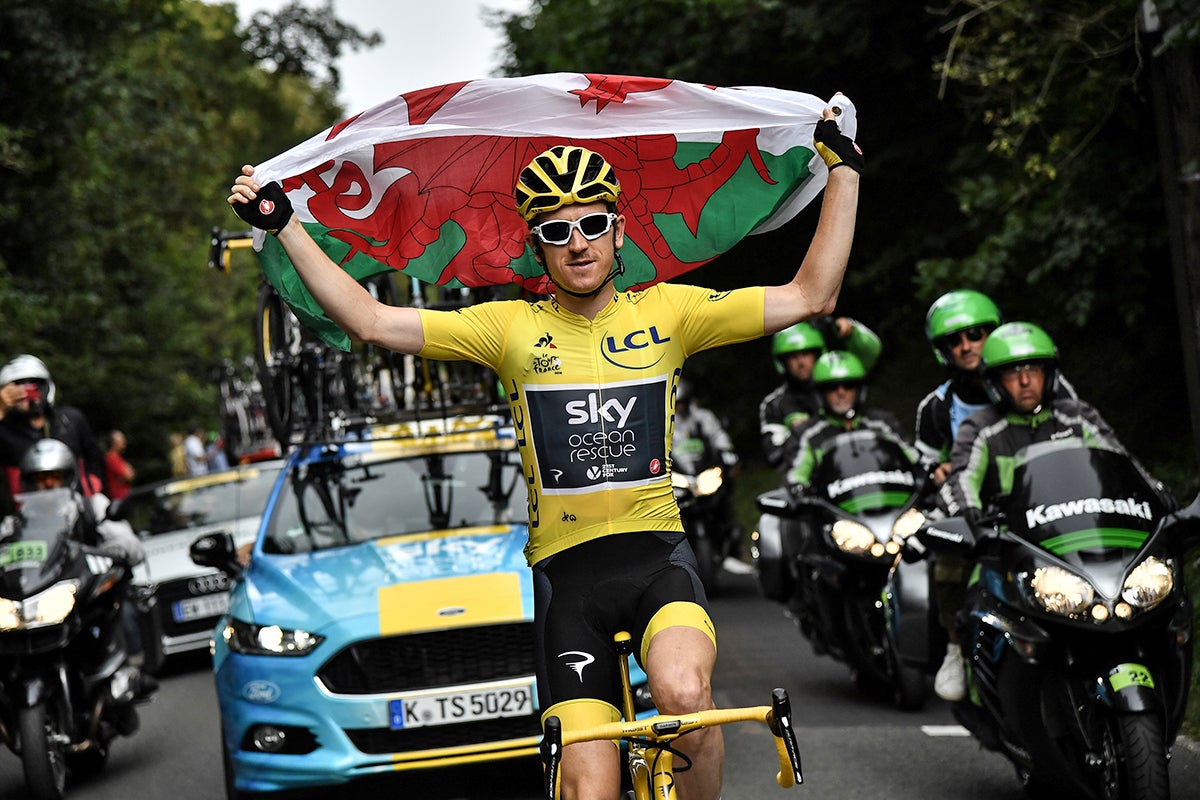Tour de France 2018: Why is reaction to Geraint Thomas’ maiden win so different to Chris Froome’s first triumph?
Thomas' first win carries the euphoria of Wiggins', rather than Froome's
If the BBC sports personality of the year award serves a purpose, it is as a gauge of the feeling on the ground, a temperature reading for the reception our leading sports stars would receive were they to pop into WHSmiths. And perhaps it is no surprise that one of the favourites to win this year’s headline award is the newly crowned Tour de France champion, Geraint Thomas.
The reaction to his triumph has been overwhelmingly positive and bears a resemblance to Bradley Wiggins’ victory in 2012. In those days the idea of a British cyclist conquering the Alps was far-fetched and although Thomas is now the third in seven years, his achievement has been received with that same sense of an ordinary bloke doing something extraordinary.
Yet it feels very different to Chris Froome’s first win of four, in 2013. Then the response was so muted it warranted an academic study by the University of Wolverhampton, who attempted to decipher why such a feat went relatively unheralded in the media. He was never considered a favourite for sports personality of the year and won only five per cent of the vote.
On the surface, there is an obvious difference between Thomas and Froome. You know people like Thomas, laidback to the point of horizontal, with a dry sense of humour. He cracks jokes in press conferences without trying too hard, takes the regularly butchered pronunciation of his name in good humour and is one of the most popular riders in the peloton.
Froome is harder to know, more calculated and precise, less relatable, a man you can’t imagine wearing jeans. He is utterly dedicated to winning and that sort of attitude rarely flies in Britain, a place where self-loathing is an admirable quality. When he talked this week about returning home for the birth of his second child there was a momentary jolt before remembering he has a life outside cycling.
But that is only part of the answer; perhaps it also has something to do with hinterland. Thomas was part of the golden summer of London 2012, winning his second Olympic team pursuit title. There is a gold-painted postbox on Castle Street in Cardiff to celebrate that triumph (there is now a campaign for a new yellow postbox too), and it is all part of what connects him to the people – the pride of Wales is a powerful thing.

Froome grew up in Kenya and then South Africa, joining the British cycling system when he was 22, and he moved to Monaco in 2011. Born to British parents, he has always insisted he had no doubt over his national allegiance. “When I represented Kenya I felt I was cheating the system: I was maybe taking a place of someone, shall we say, more bona fide Kenyan,” he told the Times last year. “As soon as I made the switch I felt I was doing things properly.” But it is tempting to wonder whether he might be more cherished in Britain had he hailed from somewhere more tangible like Yorkshire or Manchester or Great Yarmouth, rather than Nairobi.
Froome’s 2013 victory was also dogged by accusations of doping. It came soon after the Lance Armstrong scandal which saw the American stripped of his seven titles, evaporating every drop of faith in the peloton. On the rest day following Froome’s sensational win on Mont Ventoux, a long and tense press conference was dominated not by his achievement but by whether he had cheated.
In contrast, and surprisingly given a parliamentary committee concluded only in March that Team Sky cynically abused therapeutic use exemptions in 2012, Thomas was rarely asked about doping through this Tour. That might be because of the way he won the race – small gains rather than explosive rides – as well as a side-effect of his “good-guy image”, as L’Equipe put it, but it has been a noticeably absent topic.
The academic study of the media coverage in 2013, titled Racing in the Shadows, concluded that Froome’s achievements were overshadowed by the ‘folk devil’ Armstrong, and that although his African heritage was initially celebrated, he was portrayed as below Wiggins in “a hierarchy of Britishness”. Add in their contrasting personalities and it is easy to see why, in the public eye, Froome is another dubious cyclist while Thomas is a nice guy who rides a bike.
Join our commenting forum
Join thought-provoking conversations, follow other Independent readers and see their replies
Comments
Bookmark popover
Removed from bookmarks